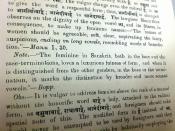GENDER
The word 'gender' is frequently used wrongly, i.e. assuming sex and gender are the same concept.
The first person to make this distinction was America psychoanalyst Dr Robert Stoller (1968). He stated that 'sex' is the biological makeup which defines the differences between men and women, i.e. external genitalia and internal genitalia. He goes on to point out that 'gender' is what make people either feminine or masculine, also that sex and gender can be independent of each other.
Gender refers to the social, cultural, anatomical, physiological, and psychological factors we have in mind when we say a person is a man or a woman, or describe that person as masculine or feminine. Gender is not only an important aspect of the way other people see us, but is also central to the way we see and understand ourselves.
The purpose of this essay is to identify the formation of gender roles from childhood and how these roles or expectations determine life chances in society.
Firstly, the definition of gender through socialisation will be looked at from Feminist and Functionalist perspectives followed by studies into the nature of gender, i.e. parental expectations, exploitation of females through children's books and the media etc. A conclusion will then be made based on the research looked at.
The feminist perspective can be divided into many sub-groups, two of which are radical feminism and Marxist feminism.
The feminist perspective on gender is that of exploitation of women through the media, children's toys and books etc. They believe that society's aim is to socialise or condition children from birth, into their expected roles in society, i.e. subordination of women and male dominance.
Radical feminists would take this argument further by stating that society is 'patriarchal', in other words, it is dominated and ruled...



Thumbs UP
Excellent work, good comparison(s)and perspective of sex/gender, and the effects our society has on them in contemporary society.
6 out of 6 people found this comment useful.